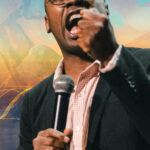With an ever-growing number of prophets and powerful men of God in Africa, there is an ever-growing need for the church to exercise discernment, even (or perhaps especially) in the case of miracles. But discernment requires boldness. Boldness to question if God is working through a person that can perform miracles. For most of us presume that the supernatural is caused by God. This can be daunting, making us feel like we are questioning God or committing the unforgivable sin. Then also we might not want to dishonour our leaders (Hebrews 13:7). Furthermore, phrases such as ‘don’t touch the Lord’s anointed’ actively discourage discernment. So, for whatever reasons, we hide behind Jesus’ well-known words: ‘Do not judge.’
The desire to honour a Christian leader’s authority is commendable. But it might not always be biblical.
This fear, caution, or desire to honour a Christian leader’s authority is commendable. However, it might not always be biblical. In fact, it’s one of the reasons many churches in Africa have been swamped by the prosperity gospel. It’s why the Word of Faith movement is thriving. Too many of us are afraid to ask: ‘Is this prophet truly from God? I know he performs miracles. But are his teachings biblical? Is his doctrine sound?’ Therefore, in this article I exhort Christians to exercise discernment without fear, because God commands it.
Discernment as an Act of Obedience
As scary as it is to exercise discernment, God requires it of us. It is one of the things that God commands of Israel, as an act of love for him. He says this explicitly regarding prophets. “If a prophet or a dreamer of dreams arises among you and gives you a sign or a wonder, and the sign or wonder that he tells you comes to pass, and if he says, ‘Let us go after other gods,’ which you have not known, ‘and let us serve them,’ you shall not listen to the words of that prophet or that dreamer of dreams” (Deuteronomy 13:1-3).
The one who said do not commit adultery also said don’t trust every miracle working prophet.
Adapting James’ words: the one who said do not commit adultery also said don’t trust every miracle working prophet, dreamer or any prophet speaking in his name (James 2:11). The way God commanded Israel to respond to false prophecy reflects how serious he is about it. Under the Mosaic law, Israel would stone false prophets to death. Of course, we don’t. The point is, exercising discernment is an act of obedience to God, regardless of how impressive the miracles or works. God commands it.
We Love God by Practising Discernment
More than sheer obedience, any love for God demands discernment. After commanding Israel to test prophets, God says: “The LORD your God is testing you, to know whether you love the LORD your God with all your heart and with all your soul” (Deuteronomy 13:3). Thus discernment reflects love. On the other hand, swallowing the teaching of the man of God whole might point to a love of man and his miracles, rather than God. We must be committed to listening to God and prioritising his truth, even if it means forgoing miracles and mighty ministries.
More than sheer obedience, any love for God demands discernment.
This is the purpose of the test in Deuteronomy 13:3. God wants to see if Israel loves him more than miracles. Thus he sends them a miracle working false prophet to test their love. Anyone that refuses to follow the miracle working prophet is the one that truly loves God. God wants his people to come to him for him, not for what they can get from him. Jesus actually withdrew from the crowds when they sought to make him king in response to a great miracle (John 6:14-15).
We must be mindful of why we come to Christ. If we come to him for miracles, we are in trouble. For Jesus distanced himself from those who came to him for signs, success, or status. Miracles can be a distraction, which is why they’re a test and why we need discernment. They reveal who follows after Christ and who is chasing after Christ’s power. Therefore if we love God we must test miracles by God’s truth. The miracle-worker who preaches another gospel stands condemned (Galatians 1:8-9).
What about Blaspheming the Holy Spirit?
Finally, one of the greatest reasons why Christians fear exercising discernment is because they are afraid of committing the unforgivable sin (Matthew 12:31). They’re afraid of speaking evil against the Holy Spirit or his miraculous works. If some prophet or man of God claims to be anointed, then aren’t we in danger of blaspheming the Spirit?
The short answer to this is: Jesus promoted discernment. He says, “Beware of false prophets, who come to you in sheep’s clothing but inwardly are ravenous wolves” (Matthew 7:15). Thus, when Jesus warns against committing the unforgivable sin, he cannot have discernment in view. John builds on the above. He writes, “Beloved, do not believe every spirit, but test the spirits to see whether they are from God, for many false prophets have gone out into the world” (1 John 4:1). So we shouldn’t be afraid that we are committing the unforgivable sin or blaspheming the Spirit when we raise questions about a Christian leader’s teaching or practice.
Discernment is a Christian discipline. Jesus expected his disciples to do it.
Claiming to be empowered or anointed by the Holy Spirit doesn’t grant a free pass when it comes to teaching and doctrine. Nor do miracles. Practicing discernment doesn’t put us in danger of committing the unforgivable sin. It is a Christian discipline. Jesus expected his disciples to do it.
Value the Truth and Fear God
I know that asking whether a pastor or prophet is truly being used by God is scary. But with God’s help it needn’t be. It should become the norm, done out of our obedience and love for God. It should be one of the disciplines we speak about when we reflect on what it means to grow in Christian maturity. Therefore, let us not be afraid to exercise discernment, even in the face of mighty miracles and powerful prophets. We are servants of God, not of men and women. Therefore we must be guided by his truth.














